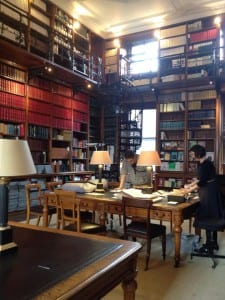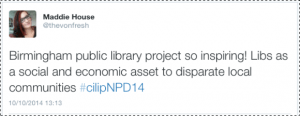Visit to the Royal Astronomical Society Library by Maddie House
By Anne Welsh, on 24 October 2014
 Editorial Note: We are grateful to Sian Prosser, Librarian of the Royal Astronomical Society for hosting this Induction Week visit. – Anne Welsh, Programme Director MA Library and Information Studies.
Editorial Note: We are grateful to Sian Prosser, Librarian of the Royal Astronomical Society for hosting this Induction Week visit. – Anne Welsh, Programme Director MA Library and Information Studies.
—–
During our induction week, some of the new LIS students were lucky enough to visit the Royal Astronomical Society Library. The Society was formed in 1820, and gained its Royal Charter in 1831. The Society’s aim was, and still is, to promote the study of astronomy and related disciplines. The Society has been collecting books, manuscripts and other works since its inception, which form the basis of the Society’s collections today. The Society’s home is at Burlington House in Piccadilly, where it is neighboured by the Royal Academy of Arts, the Royal Society of Chemistry and the Linnean Society, among others.
We were shown round the beautiful building by the Society’s Librarian, Sian Prosser. She told us about the history of the collections and the challenges of managing the Society’s archive and rare book spaces. We were shown the wonderful wood-panelled reading rooms which house some of the collections. The Society holds regular talks and events in these rooms of the library. One of the highlights for me was seeing the Rare Book Room which holds, among many other treasures, a piece of wood from the apple tree in Isaac Newton’s garden. Sian very kindly laid out some unique items from the collection for us to see, including Astronomicum Caesareum by Peter Apian, published in 1540. The book contains many brightly-coloured, moving discs which can be used to calculate the position of planets. There was also a first-edition of Copernicus’ De Revolutionibus Orbium Coelestium (On the Revolutions of the Heavenly Spheres), which revolutionised astronomy at the time of its publication in 1543.
After a look at the treasures, we sat down to talk shop! It was fascinating to hear about the role of the librarian in an well-established organisation such as the Royal Astronomical Society. Sian talked to us about the challenges of being a sole practitioner in terms of planning and managing your workload, but also about the opportunities that can be gained by broadening your skill set, taking on new challenges and establishing new professional knowledge and networks: in this case, by learning about the distinguished history of the Society and getting to know current members. She told us about some of her potential plans for the future, which include some retrospective cataloguing (the Library holds 300 current periodicals as well as over 3000 ceased journal titles), liaising with other astronomy libraries and archives internationally to map shared collections of journals and to perhaps plan for digitisation of some titles, and extend the Society’s already impressive outreach activities around its collections. She also mentioned that as a sole practitioner, having a professional support network of librarians to talk to (both in the other libraries at Burlington Place and in the wider world) was very helpful – something to bear in mind as we continue to build our professional networks! In all, it was a fascinating and inspiring visit to a beautiful and unique institution. Thank you very much to Sian for inviting us!
—–
Maddie House (@thevonfresh) is studying part-time for her MA LIS, while working in an academic library.
Image: Anne Welsh. Used with permission.
 Close
Close





